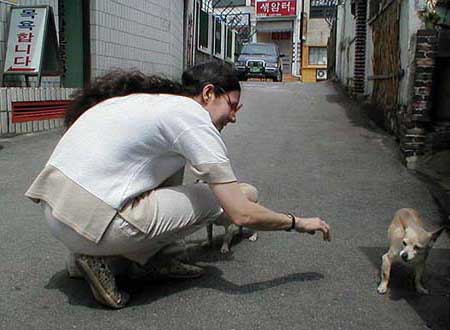

|
OK, let's deal with the unpleasant and unavoidable right up front. Yes, some Koreans do eat
dog meat. I've also run across reports that cats are sometimes turned into "health
tonics," but with no real evidence, I can't swear it's true. I've read a few people who seem to think that using dogs as food started during and after the Korean war, when there just wasn't much of anything to eat. But from what I can tell, the practice goes back many centuries. It came to Korea from China. Eating dog has been technically illegal in Korea since 1991. The law wasn't too broad nor was it much enforced, except when Korea was unusually visible internationally - the Olympics, for example, and 2002's World Cup Soccer. In 2024 Korea's parliament passed a law specifically banning breeding, slaughtering and selling dogs for meat. But it won't take effect until January 2027. For now, the bow-wow eateries are still here. If you're so inclined, a little searching through the alleyways of any major Korean city will turn up restaurants which offer dog stew (originally called Kae Jang Kuk, now commonly known as Boshintang or Satcholtang). Just look for the sign with a picture of a dog on it. Most of the world is mortified, but older Koreans think that dog meat is health food. Dogs don't perspire, so they have this idea that their meat will help you resist Korea's thick summer heat. Men think it improves their sexual performance, curing impotence and enhancing stamina. It's also supposed to promote healing. When Margaret was in Korea in 2000, one of her friends who'd had surgery was eating it on doctor's orders. In the early 2000s, Korea slaughtered about 3 million dogs per year. in the 2020s, that fell to around 1 million - still a lot.
For all that, Koreans
Large mutts are not so lucky. The dark-colored ones get guard duty and seldom get to live inside. Light-colored large dogs tend to end up in the stew pot. As crowded as Korea is, you'd think cats would be their ideal pets. Older Koreans still think that they carry disease, and have some weird superstitions about them (it's the eyes). But cats as pets have caught on, especially with younger folks. In Margaret's first Korean months in 2000, she saw only a few pet cats. Once she'd adopted Nabi, she had to use beach sand for kitty litter, and she could find only one pet shop that sold Purina Cat Chow. But in 2004, E-Mart was carrying both. In 2014, we saw many pet shops whose windows were well-stocked with cat toys, and Korea had gone in for cat cafes in a big way. So, in 2024, let's hope that Korea is finally realizing that our furry friends give them more joy alive than on their dinner plates.
|